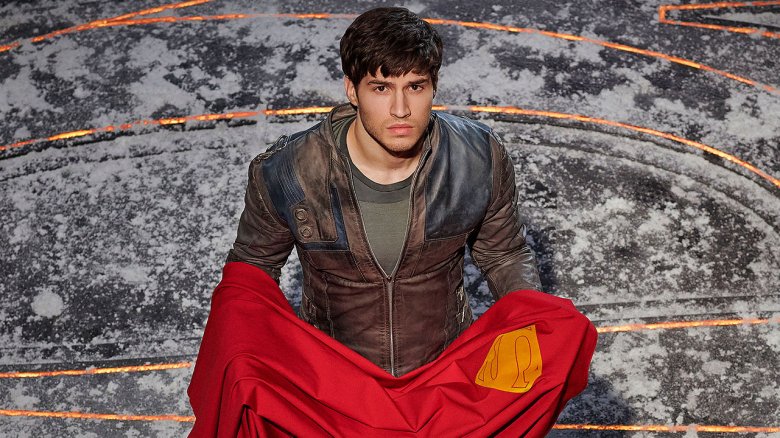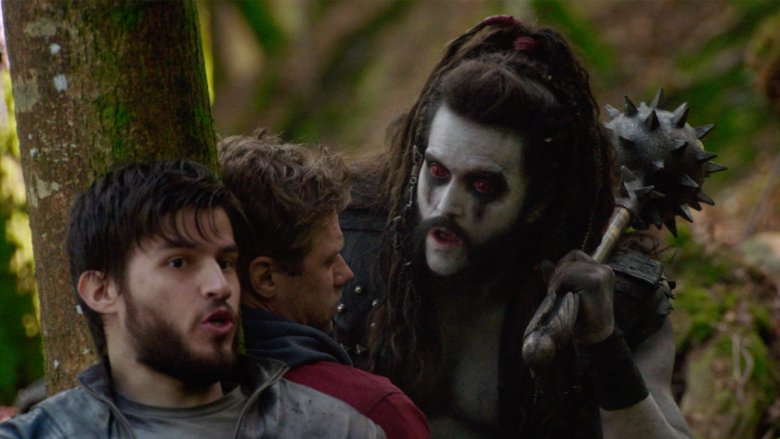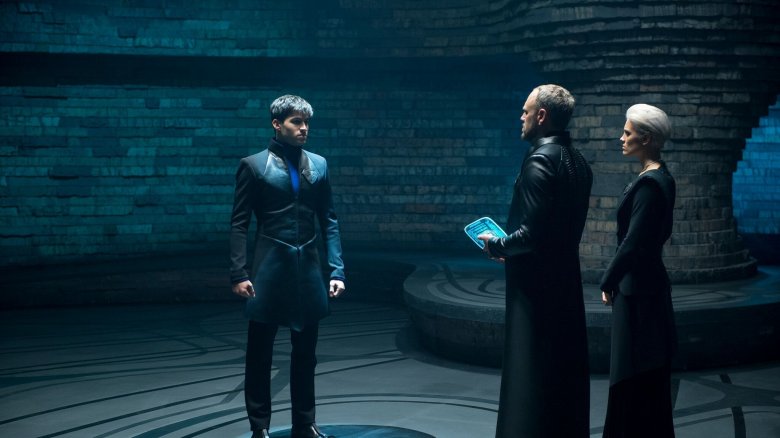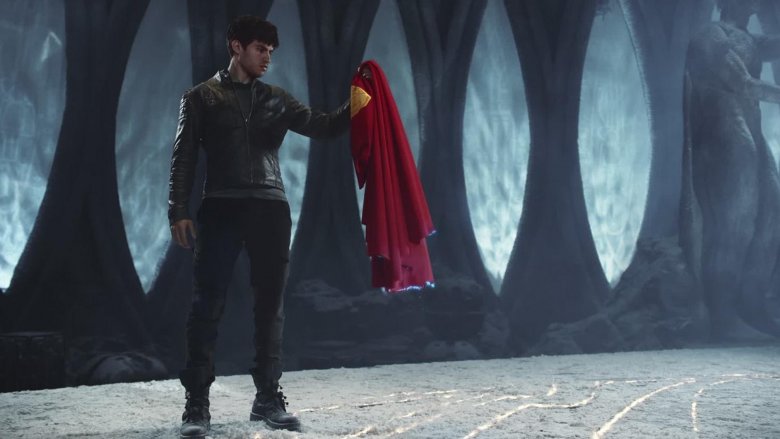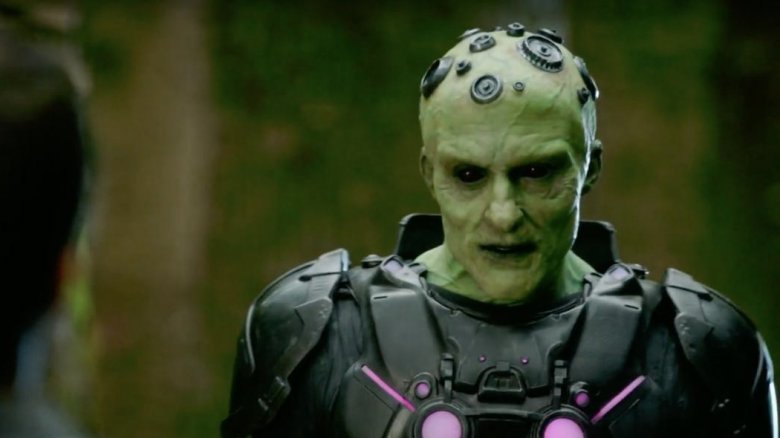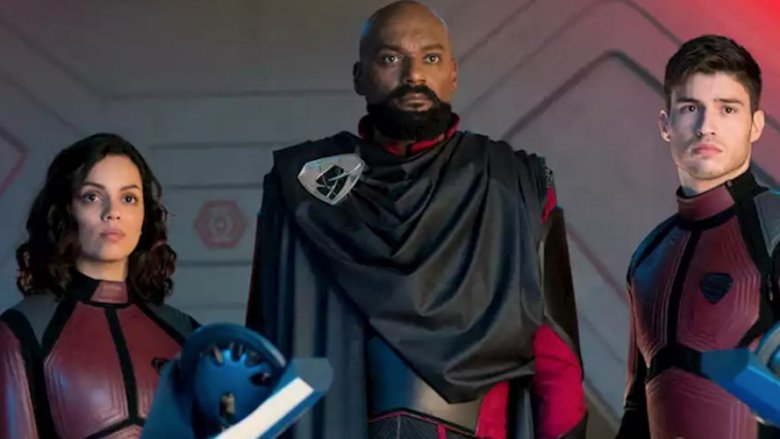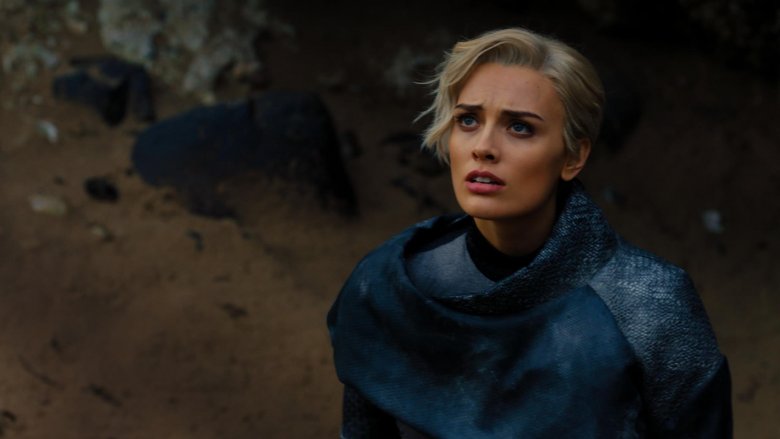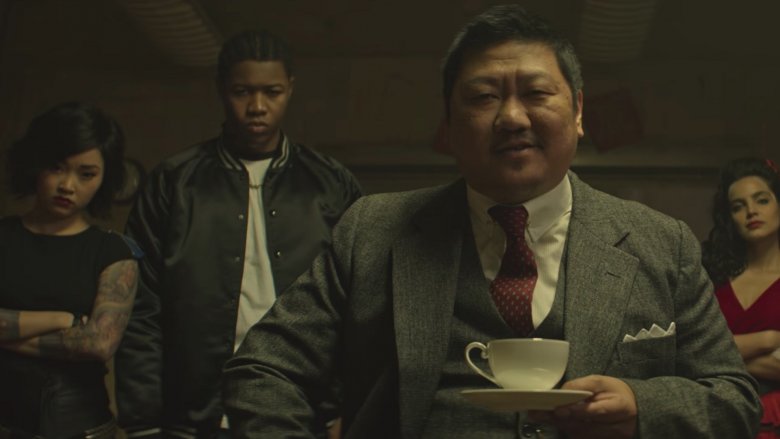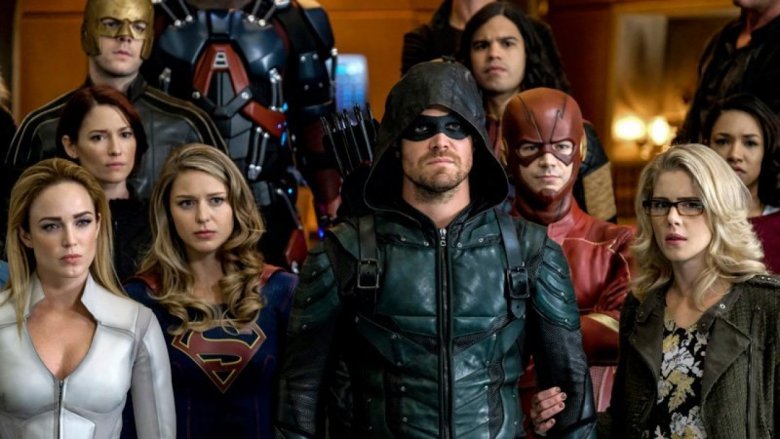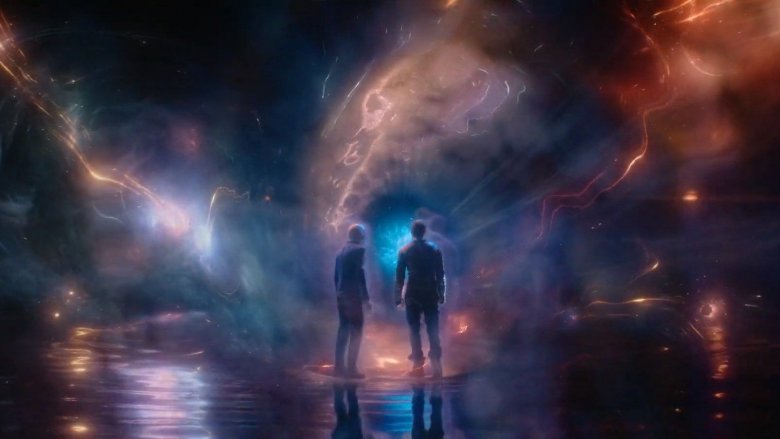The Real Reason Krypton Was Cancelled
August of 2019 was rough for fans of DC Comics' television properties. News broke that Syfy's Krypton — whose second season finale had just aired — wouldn't be renewed for a third season. Likewise, plans for an upcoming Lobo spinoff were canceled. The news came only two months after the cancellations of two other comic book adaptation series, Happy! and Deadly Class.
The cancellation is at least a little surprising for a few reasons. Krypton's second season has been critically more well-received than its first. The season was heavily promoted with the introduction of DC's ultraviolent "Main Man" Lobo, the continuing villainy of Brainiac (Blake Ritson) and General Zod (Colin Salmon), and the promise of finally seeing the powerful Doomsday in action — he was heavily teased in season 1 but spent most of the time stuck in a high-tech storage pod. And the season premiere included promising developments including Nyssa (Wallis Day) finding herself on Rann in the midst of a war with the winged Thanagarians, Brainiac bringing the infant Jor-El to Earth, and Lobo (Emmett J. Scanlan) and Seg-El (Cameron Cuffe) teaming up to take out Brainiac and rescue Seg's son.
So what went wrong? Well, if you were a fan of the series then it's easy to understand why you might be confused, but it seems like there are some genuine reasons for Syfy to pull the plug. Let's look at the real reasons Krypton was blown up earlier than expected.
Krypton's ratings dropped steeply in season 2
If you judge it purely by the critical reception, Krypton's cancellation will cause a lot of confusion. Critics almost unanimously praised the series' second season over its first — IGN's David Griffith who called it "bigger and bolder," and Eric Joseph from We Got This Covered wrote that before the axe came down the series was "finally finding its potential." None of this changes the fact that you can make one of the best shows on TV, but if nobody watches it, then nobody watches it.
Which isn't to suggest nobody watched Krypton's second season, but the numbers dropped significantly for the series. According to CinemaBlend, Krypton's series premiere was a huge success for Syfy, winding up being the channel's "most-watched debut in four years." But the viewership plunged in the show's second season. While the average viewership for a season 1 episode of Krypton was close to 790,000, TV Series Finale reports that Krypton's second season finale attracted only 350,000 — less than half of most season 1 episodes. The latest season overall suffered a 54 percent ratings drop and a 48 percent decrease in viewership.
So while the critical praise was obviously a welcome development for the folks making the show, it wasn't enough to keep people watching.
Krypton's first season didn't impress
Looking at many of the reviews for Krypton's latest season and its first, you'd practically think they were talking about different series altogether. While the Rotten Tomatoes audience score between both seasons is pretty consistent — 80 percent for season 1 and 78 percent for season 2 — Krypton's first season critical score on is an unimpressive 60 percent versus the second season's 100 percent. The first season's critics wrote that the series was "too much of a slog" to bother following and that it was characterized by "convoluted plotting and forgettable character arcs."
So while those same critics and more may have been impressed with Krypton's growth in the second season, everything about the first season that disappointed them may have kept viewers away. The appearance of the violently vulgar Lobo and the promise of more Doomsday smashing may not have been enough to win back fans who stopped being fans as soon as the first season shuttered, or earlier.
Krypton is a Superman show...with no Superman
Krypton is something of a prequel series (though not completely, because of the strong time travel element), taking place long before the birth of Kal-El, a.k.a. Superman. The lead, Seg-El (Cameron Cuffe) is Kal's grandfather and when the series opens, his son Jor-El — Superman's father — hasn't been born yet.
So Krypton is a Superman show... with no Superman. In fact, not only is the Superman with whom we're familiar absent, because most of the story takes place on Krypton — and his godlike powers come from exposure to Earth's yellow Sun – no one in the show has Superman's abilities, not even his old enemy General Zod.
You could argue that Gotham was similarly a Batman show without Batman — until the finale, at least — and that series enjoyed enough success to end on its own terms, but Bruce Wayne is there. He's a boy still under the butler Alfred's care, and as early as the first season it becomes clear viewers are watching his evolution into the Dark Knight. In Krypton, on the other hand, Superman has not even been conceived. As of its final episode, Superman's father is an infant.
Krypton's pool of villains was spent
One thing that helps Gotham is one of the Batman franchise's chief strengths — his rogues' gallery. The Dark Knight has some of the best, most charismatic, and most recognizable villains of any superhero. Batman bad guys like Penguin and the Riddler are regulars on Gotham and there are a whole host of recurring villains familiar to Batman fans like the Joker, Poison Ivy, Ra's al Ghul, and Zsasz.
Superman, on the other hand, doesn't enjoy a wealth of popular villains. The most famous is Lex Luthor and Krypton's setting and time period make his involvement unlikely. By the end of Krypton's second season we've met General Zod, Brainiac, and Doomsday, and that's pretty much it as far as popular Superman villains are concerned. Sure, Mister Mxyzptlk might be a possibility, and the newly introduced comic book villain Rogol Zaar — revealed to be responsible for Krypton's destruction in the comics — might very well have been an inevitable addition, but that's about it. Superman's bad guys just don't have the same popularity as Batman's.
Between comics, movies, TV shows, and video games, we've been saturated with the Batman mythos for decades. Batman villains who used to be relatively obscure are practically household names now. Superman's bad guys aren't quite as memorable, and would be next to impossible to introduce in a narrative in which their nemesis isn't even born yet.
Krypton's time travel element made things weird
Krypton is often called a prequel series, but the word doesn't really fit. Krypton's premise and plot are dependent upon time travel. Adam Strange (Shaun Sipos) travels back from the present to make sure things unfold as they should. He brings Superman's cape with him, and the cape disintegrates as time goes haywire. By the end of the first season, the cape has completely reappeared, but bears the sigil of House Zod.
There are some strange things about Krypton being, essentially, a non-prequel prequel. Perhaps more than anything, there's the relationship between Seg, Lyta-Zod (Georgia Campbell), and General Zod, a.k.a. Dru-Zod. You eventually learn in the first season Seg and Lyta are Zod's parents, which is just... weird. The parents never seem to have a difficult time adjusting to this new information. They immediately start speaking to Dru as if they care for him as much as any boy they raised even though they just met him. And it's a little jarring that Colin Salmon, who plays Dru-Zod, is three decades older than the actors playing his parents.
Once Dru assumes leadership of the planet in season 2, no one has a problem accepting he's a time traveller. In the first season acknowledging there might be intelligent alien life in the universe is considered heresy, yet in season 2 everyone is fine with their leader claiming to be a time traveller whose parents are young enough he can probably give them a bedtime.
Krypton was about to have little to do with Krypton
By the end of Krypton's second season, the show's title hardly seems to fit. Hoping to save Jor-El, Nyssa's used Adam's Zeta Beam device and is on the planet Rann. Brainiac and Jor-El are on their way to Earth. Seg and Lobo have formed a doubtlessly complicated alliance, with Lobo wanting to hunt down and destroy Brainiac and Seg intent on saving his son.
In other words, if Krypton had made it season 3, it doesn't seem like much of the show could've taken place on, you know, Krypton. The show seemed to be expanding beyond the boundaries of Superman's home planet, becoming more of a showcase for DC's cosmic mythos. Which makes sense. After all, like any comic book show, Krypton would want to keep bringing in characters from the comics, and staying on Krypton limits who can show up considering the place explodes as soon as it appears in the comics.
In a way, Krypton's very premise paints the series in a corner. You can only explain how non-Kryptonian characters keep showing up on the planet in so many ways. But if you go too far outside the original setting, how do you reel the story back in and focus on the last days of Krypton?
Syfy may be losing faith in comic book shows
Krypton isn't the first comic book series to get axed by Syfy. In June 2019 it was announced neither the black comedy Happy! nor Deadly Class – both based on creator-owned comics – would be renewed. Krypton's demise was shared by upcoming spinoff Lobo, based on the unkillable interstellar mercenary from the comics. The Main Man's live-action counterpart is introduced in Krypton's season 2 premiere while on the hunt for Brainiac, and characteristically not caring all that much about the collateral damage.
So it may be that, for whatever reason, Syfy is getting skittish about comic book-based series. Considering the nature of the channel, you'd think they'd be a perfect fit. But for whatever reason, Syfy seems particularly quick to pull the trigger when it comes to comic book properties. It could have something to do with the competition.
The field of superhero shows is getting more crowded
When it comes to superhero and comic book TV shows, Krypton was hardly the only choice. Marvel's Netflix shows might all be cancelled, but the upcoming Disney+ MCU series are already hotly anticipated. Agents of S.H.I.E.L.D. still has one more season planned, Cloak & Dagger and Runaways have an upcoming crossover, and Hulu's Ghost Rider is on its way. Amazon Prime's The Boys made a big splash, as did Netflix's Umbrella Academy. Even though Swamp Thing barely got a chance to prove itself, the DC Universe streaming service had successes with the first seasons of Titans and Doom Patrol, and there's still the upcoming Stargirl to look forward to.
Then there's the CW's Arrowverse, which is still going strong. Arrow is about to come to a close, but there's still The Flash, Legends of Tomorrow, Supergirl, Black Lightning, and the series premiere of Batwoman. Most of those series will be involved in the huge Crisis on Infinite Earths crossover, which will include Brandon Routh reprising his role as Superman, Kevin Conroy playing Batman, and Burt Ward, who played Robin in the classic '60s Batman series.
It could be that the powers that be at Syfy are looking at the field of superhero and comic book shows and thinking there's just too much competition out there, or perhaps even predicting the culture is reaching the point of over-saturation.
Krypton's inevitable ending limited the series
Unlike other prequel comic book TV series that managed to succeed, Krypton was hobbled by the ending we all knew was coming. Unless the creative team planned the series to feature an alternative narrative to the story we all know, Krypton would have ended with the destruction of Krypton and presumably the deaths of most — if not all — of its lead characters.
The argument could be made that successful series like Gotham and Smallville also had similarly predictable endings, and that's true in the sense we knew each would end with specific characters becoming superheroes. But neither Gotham nor Smallville explodes in their origin stories. Sure, you know going into Gotham that falling in love with Thomas or Martha Wayne would be foolish (and tough considering they die in the same scene in which they're introduced), but all the other major players will survive. If the origin story of Batman included the city of Gotham being utterly destroyed right before Bruce Wayne pulls on a mask — as well as with the deaths of Selina Kyle, James Gordon, Harvey Bullock, Alfred and the rest — the series would've been a lot more limited.
